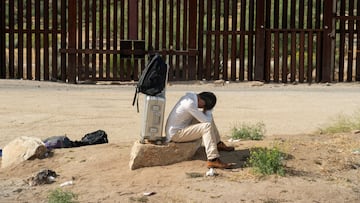Proposal to allow for border crossing arrests in Arizona: What to know and when will voters decide?
Arizona’s new border detention law will be sent to the voters this November. What does it consist of and how does it differ from actions taken by President Biden this week?


Arizona’s Congress is looking to follow Texas’s lead by passing a new law that would make unauthorized border crossings a state crime. The bill was approved by a vote of 16 to 13 in the Senate and 31 to 29 in the House of Representatives. However, it still needs to be put to a popular vote to become law.
What is the new border detention law in Arizona?
Similar to the controversial SB4 in Texas, this new bill would give state and local authorities the power to arrest immigrants who cross illegally into the United States through the southern border of Arizona. It would also allow state judges to order detainees to return to their country of origin.
Originally, the federal government was responsible for arrests and deportations. However, and not without controversy, as the crisis at the southern border grows, states have begun to adopt their own immigration policies. Such is the case of Texas, where Governor Abbott signed a similar law that has been suspended indefinitely by the US Supreme Court as the justices evaluate the constitutionality of the text.
When will the law be voted on?
Arizona Governor Katie Hobbs vetoed a similar bill in the past, so Congress has modified the new measure to allow it to be put to a citizen vote in the next general elections, scheduled for Tuesday, November 5.
However, even if voters favor the measure, the Supreme Court could intervene, as they did in the case of the Texas law. The Supreme Court is not convinced that a state government can bypass the federal and make its arrests and deportations.
Other measures to confront the migration crisis
Hours after the Arizona Congress approved the detention initiative at the southern border, President Biden signed an executive order to suspend asylum applications in the United States. This action was taken to accelerate deportations since immigration officials will deport migrants who cross without authorization without processing their respective requests for humanitarian protection.
Yesterday I spoke about what we need to do to secure our border, and in the weeks ahead I will speak to how to make our immigration system more fair and just.
— President Biden (@POTUS) June 5, 2024
Let’s fix the problem and stop fighting about it – I’m doing my part. pic.twitter.com/T3nZphIFwQ
Human rights organizations, like the ACLU, have raised major concerns that this move by the United States could violate the human rights of asylum seekers at the Southern border.
BREAKING: The Biden administration just announced an executive order that will severely restrict people's legal right to seek asylum, putting tens of thousands of lives at risk.
— ACLU (@ACLU) June 4, 2024
This action takes the same approach as the Trump administration's asylum ban. We will be challenging…
Related stories
The order makes it more challenging for people to claim asylum, which the ACLU argues will “rush vulnerable people through already fast-tracked deportation proceedings, sending people in need of protection to their deaths.” A similar message was heard from Physicians for Human Rights, who posted on X that the president’s action “[places] arbitrary limits on asylum claims at the U.S. border subjects thousands of people escaping life-threatening violence to further risk and trauma.”
Why has President Biden enacted this executive order?
The Biden Administration may believe that this tough-on-immigration stance will give them an advantage against Republicans in the fall as the situation at the border becomes a main talking point among GOP leaders on the ballot, most notably Donald Trump. In his remarks announcing the order, President Biden said that action was necessary after facing “Republican obstruction” on a deal on Capitol Hill. The order makes it more challenging for people to claim asylum, which the ACLU argues will “rush vulnerable people through already fast-tracked deportation proceedings, sending people in need of protection to their deaths.”
Complete your personal details to comment